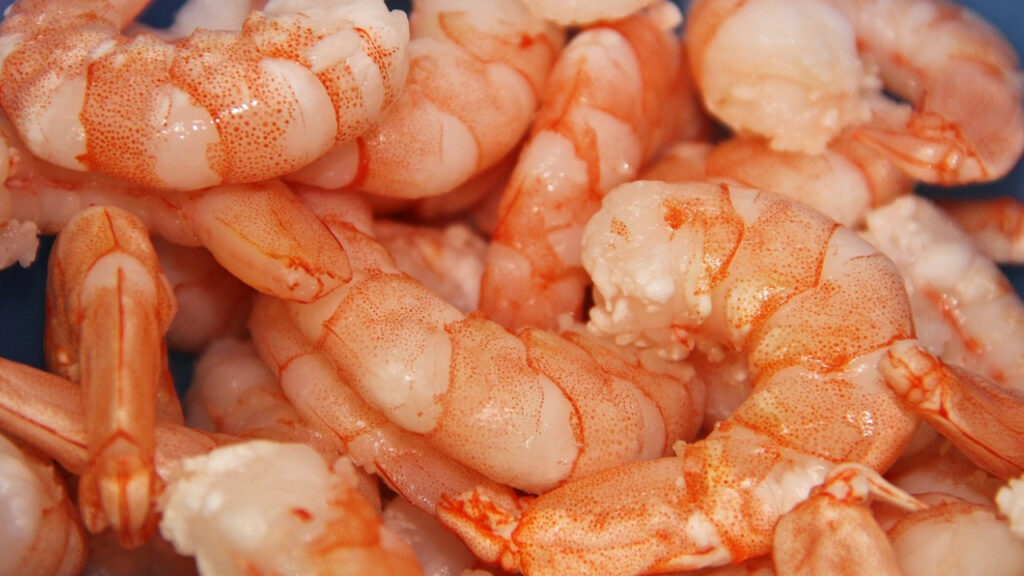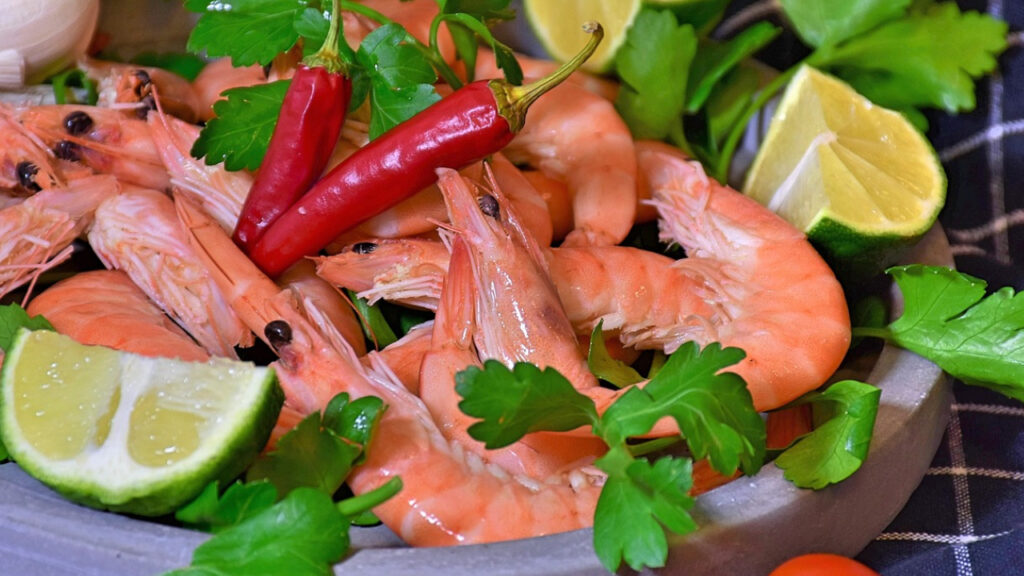
Shrimp, those delicious crustaceans from the sea, have long been a favorite on dinner plates across the world. Whether grilled, steamed, or served in creamy pasta dishes, shrimp have a unique flavor and a delicate texture that appeals to many palates.
But can rats eat shrimp?
Yes, rats can eat shrimp in moderation. Shrimp is a source of animal protein, which can be part of a rat’s diet. However, it should be an occasional treat, not a primary food source. Make sure the shrimp is properly cooked, cut into small pieces, and free from any seasoning.
So, should you feed shrimp to your rats or not?
Let’s find out!
Table of Contents
Can Rats Eat Shrimp?
Well, the good news is that rats can eat shrimp, but there are a few things to keep in mind.
Shrimp is a type of seafood, and it’s safe for rats to eat in moderation. It can be a tasty and nutritious treat for them. You can give your rat a tiny piece of cooked and unseasoned shrimp now and then, like a special snack.
But remember, rat is a small critter, so don’t give him too much shrimp. Just a small piece is enough because seafood can be a bit salty, and too much salt isn’t good for rats.
Also, always make sure the shrimp is fully cooked.
Raw or undercooked seafood can be harmful to rats, just like it can be for us.
So, cook the shrimp properly, let it cool down, and then share a little bit with your little pet.
Raw or Cooked Shrimp for Rats?

Well, would you eat raw shrimp? No right.
So the same goes with your rats.
While rats can eat raw food, its it’s best to give them cooked shrimp rather than raw shrimp.
Here’s why:
- Cooking shrimp helps eliminate the risk of harmful bacteria or parasites that can be present in raw seafood. Raw seafood can potentially make your rat sick, just like it can affect humans.
- It makes the shrimp softer and easier for your rat to chew and digest. Rats have small teeth, so cooked shrimp is less likely to pose a choking hazard.
- Cooked shrimp usually has a milder and more pleasant taste, which rats may find more appealing.
So, to be safe and ensure your rat enjoys the shrimp you offer, it’s a good idea to cook it first. Boiling, steaming, or baking the shrimp without adding any spices or seasonings is the way to go.
Once it’s fully cooked and cooled down, you can offer a small, bite-sized piece as an occasional treat for your furry friend.
Related read: Can Rats Eat Tuna? [Let’s Find Out!]
Is Shrimp a Healthily Choice for Rats?
Shrimp can be a healthy choice for rats when offered in moderation
A typical serving of shrimp (3.5-ounce) contains:
- Calories: Approximately 99 calories
- Protein: About 24 grams
- Fat: Less than 1 gram
- Omega-3 Fatty Acids: Approximately 0.3 grams
- Vitamin B12: About 1.2 micrograms
Other health benefits of shrimp may include:
Protein
Shrimp is a good source of high-quality protein. Protein is important for growth, muscle maintenance, and overall health in rats.
Omega-3 Fatty Acids
Shrimp contains omega-3 fatty acids, which are essential for brain health and can help reduce inflammation.
Vitamins and Minerals
Shrimp provides essential vitamins and minerals, including vitamin B12, iodine, and selenium.
These nutrients are important for various bodily functions, such as maintaining a healthy nervous system and thyroid function.
Now, while shrimp can offer these nutritional benefits, it’s crucial to remember that rats have specific dietary needs, and their primary food should come from a high-quality rat food mix, which is designed to meet all their nutritional requirements.
Risks of Overfeeding Shrimp to Rats
Overfeeding shrimp to rats can pose some risks to their health.
While shrimp can be a tasty and nutritious treat when given in moderation, providing too much or too often can lead to several potential issues:
High Salt Content
Shrimp, especially when seasoned or processed, can be high in salt.
Overconsumption of salt can lead to health problems for rats, including dehydration, increased thirst, and kidney issues.
Obesity
Shrimp, like any treat, can be calorie-dense. Feeding your rat excessive amounts of shrimp can lead to weight gain and obesity.
Obesity can result in various health problems, including heart issues and joint pain.
Digestive Problems
If rats eat too much shrimp at once, they may experience digestive discomfort, such as diarrhea or upset stomach.
Calcium Imbalance
Some types of shrimp shells contain calcium, which is healthy in moderation but can lead to an imbalance if consumed in excess.
Too much calcium can cause health problems like bladder stones.
So, it’s best to offer shrimp as an occasional treat. Stick to small servings of properly cooked and plain shrimp, and make sure it complements their balanced rat food mix.
This way, you can enjoy giving your rat a special treat while avoiding potential health risks.
How Many Shrimp Can Rats Have?

Rats are small animals, so they should only have a very small amount of shrimp.
As a general guideline, you can offer your rat a piece of shrimp that’s about the size of the tip of your pinky finger or even smaller. That’s usually enough for one serving.
It’s important not to give them too much shrimp because seafood can be a bit salty, and rats don’t need a lot of salt in their diet.
Too much salt can be harmful to them.
Remember, shrimp is meant to be an occasional treat for your rat, not a regular part of their diet. Their main food should be a balanced rat food mix, and you can use shrimp or other treats sparingly to add some variety to their diet and make them happy.Top of Form
Can Rats Eat Dried Shrimps?
Yes, rats can eat dried shrimp as an occasional treat, but just like with any treat, it’s important to give dried shrimp to your rat in moderation.
Dried shrimp are often salty, and too much salt can be harmful to rats.
Offer them a small piece or two as an occasional snack.
When buying dried shrimp, make sure they are plain and do not contain any added spices, seasonings, or preservatives.
Some dried shrimp products made for human consumption may have added ingredients that are not suitable for rats.
Can Rats Have Shrimp Shell?
Rats can technically eat the shells of shrimp, but it’s generally not recommended.
Shrimp shells are tough and can be challenging for rats to digest.
Rats have small teeth and may struggle to break down and process the shells properly, potentially leading to digestive discomfort or blockages.
Also, thesharp edges on shrimp shells can pose a risk to your rat’s mouth and throat.
Rats might accidentally injure themselves while trying to eat the shells.
So, it’s generally best to remove the shells from shrimp before offering them to your rat. If you want to provide your rat with the nutritional benefits of calcium, there are better and safer sources, such as commercially available rat food or supplements specifically designed for rodents.
How to Prepare Shrimp For Your Rats
If you want to prepare shrimp for your pet rat, it’s pretty simple.
Here’s how to do it:
- Get Some Shrimp: First, you need some shrimp. Make sure they’re cleaned and not too big, just a little piece.
- Cook the Shrimp: You can boil them in water or cook them in a pan, but don’t add any spices or stuff like that. Keep it plain.
- Cool It Down: After cooking, let the shrimp cool down because rats don’t like hot food.
- Cut It Small: Rats have small mouths, so cut the shrimp into a little piece, like the tip of your pinky finger. This makes it easy for your rat to eat.
- Serve as a Treat: Now you can give your rat this little piece of cooked shrimp as a special treat. Remember, it’s not their main food; it’s just like candy for them.
- Watch and Enjoy: Stay with your rat while they munch on their shrimp to make sure they like it and don’t have any problems.
And that’s it!
Shrimp can be a yummy and healthy treat for your rat when you prepare it this way. It’s like giving them a tiny, delicious treat once in a while.
Can Baby Rats (Rat Pups) Eat Shrimp?
Feeding baby rats, also known as rat pups, is different from feeding adult rats.
While adult rats can have shrimp as an occasional treat, it’s generally not recommended to feed shrimp to rat pups for several reasons:
Firstly, baby rats have sensitive and delicate digestive systems.
Foods like shrimp can be hard on their developing stomachs and may lead to digestive upset.
Rat pups have specific nutritional needs for growth and development. Their primary diet should consist of a high-quality, specially formulated rat pup food. This food is designed to provide the essential nutrients they require at this stage of life.
So, it’s best to stick with the recommended diet for baby rats, which includes commercial rat pup food and fresh water.
Once they’re older enough, you can gradually introduce small, safe treats, like small pieces of cooked vegetables and fruits.
Can Mice Eat Shrimp?
Mice can technically eat shrimp, but it’s not a natural or recommended part of their diet. Mice are primarily omnivores but typically feed on grains, seeds, and plant material.
While they can consume small amounts of protein from insects or meat, such as shrimp, it’s not ideal for them.
If you plan to offer a treat like shrimp, it should be a very small amount.
Make sure its fresh, properly cooked, before giving it to your pet.
Thus, you can offer shrimp few times a month but ideally, they should feed on grains, seeds and other means.
Alternatives Feeding Options for Rats
Feeding pet rats a balanced and nutritious diet is essential for their health.
Here are some alternative feeding options for rats:
Commercial Rat Pellets
High-quality commercial rat pellets are formulated to provide rats with the essential nutrients they need.
Look for brands that offer a balanced diet with a variety of ingredients. This should be the primary staple of their diet.
Fresh Fruits and Vegetables
Rats can enjoy a wide range of fresh fruits and vegetables.
Some excellent options include apples, carrots, broccoli, peas, kale, and bell peppers.
These provide essential vitamins and fiber. Avoid feeding too much citrus fruit, as it can be acidic.
Grains and Cereals
Rats can eat grains like rice, oats, barley, and whole-grain pasta.
These can be served cooked or dry. Whole grains are a good source of carbohydrates and fiber.
Proteins
In addition to the commercial pellets, rats can have a source of animal protein, such as lean cooked meats (e.g., chicken or turkey) or cooked eggs.
Be sure to provide it in moderation.
When offering different foods to your rats, keep in mind their dietary preferences, and monitor their reactions.
Rats can be picky eaters, so it may take some trial and error to determine their favorite foods. Avoid feeding them high-sugar or high-fat foods in excess, as this can lead to obesity and health problems.
Final Thoughts
To sum up, rats can indeed enjoy the occasional indulgence of shrimp.
These small crustaceans provide a source of animal protein, which can complement a rat’s diet. However, it’s crucial to emphasize the term “occasional” when offering shrimp to your pet rat. The primary source of nutrition for these small rodents should come from commercial rat pellets, fresh fruits, vegetables, and grains.
Shrimp should be served as a treat, prepared in a way that ensures it’s safe, fresh, and manageable for your rat to eat.
Remember do not overdo anything!
Before you leave, here are more helpful articles:
